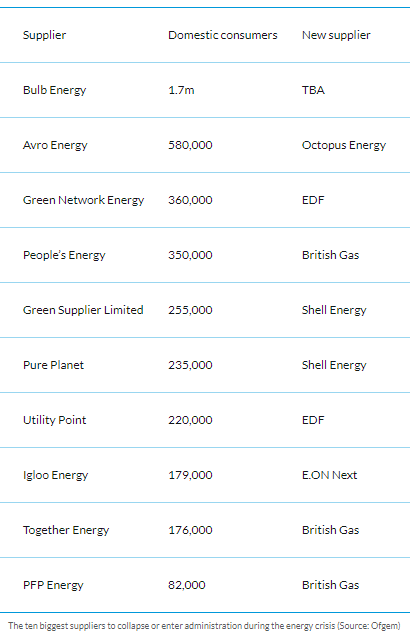Parliamentary body hammers Ofgem for £2.7bn clean-up bill to fix crisis-hit energy sector

British households face an eye-watering £2.7bn clean-up bill following market carnage across the energy sector, with customers expected to shoulder the burden for the collapse of 28 suppliers since last June.
This is a 50 per cent hike on Ofgem’s previous estimates, with the watchdog originally designating £1.8bn in billpayer funds to compensate energy companies ferrying 2.4m stranded customers from fallen firms to surviving suppliers via its last resort process.
The National Audit Office (NAO) today laid the blame at the regulator’s door, hammering Ofgem for its ‘low bar’ to entry into the energy market.
The independent parliamentary body argued, prior to the crisis, new suppliers had been let into the industry without sufficient financial scrutiny, meaning many suppliers lacked the resilience, liquidity and required hedging strategy to deal with the spike in wholesale prices amid Russian supply shortages and rebounding pandemic demand.
Alongside suppliers, NAO also considered the price cap to be poorly designed amid sustained hikes in wholesale prices – with many firms unable to pass on soaring costs to consumers due to the cap’s constraints.

It is not the first group to criticise Ofgem’s handling of the crisis with Citizens Advice previously accusing Ofgem of failing to act against “unfit energy suppliers for nearly a decade”.
NAO chief Gareth Davies said: “Consumers have borne the brunt of supplier failures at a time when many households are already under significant financial strain having seen their bills go up to record levels. A supplier market must be developed that truly works for consumers.”
This reality was laid bare yesterday by energy specialist Cornwall Insight, which has forecast the price cap will rise to £2,980 this autumn, and above £3,000 per year in January – during the coldest month of the year when demand is at its peak.
Jonathan Brearley, Ofgem’s chief executive, warned Parliament last month that the price cap was likely to rise to £2,800 per year in October.
The announcement triggered Rishi Sunak’s unveiling of a £15bn financial package for households – including up to £1,200 per year savings for the most vulnerable energy users.
Watchdog rolls out reform to fix energy industry
The £2.7bn figure does not include Bulb Energy’s descent into administration – the UK’s seventh biggest energy supplier and home to 1.6m customers.
Since November, Bulb has been on life support – propped up by transfusions of public funds estimated at over £3bn, the biggest state bailout since RBS in 2008.
Ofgem has revealed multiple reforms to the energy market in recent months such as stress tests, fit and proper persons, and market stabilisation charges.
It is currently pushing for protection and ringfencing measures for consumer credit balances and renewable obligations, and has launched a consultation seeking views on these proposals.
Earlier this week – it revealed plans to make improvements to the financial health of suppliers, to ensure they can weather the current challenges and reduce the risk of failures
It is also advocating requirements for suppliers to have better control over the key assets they need to run their supply business.
Ofgem has also called for a tightening of the rules on the level of direct debits suppliers can charge customers, to ensure credit balances do not become excessive.
However, Good Energy boss Nigel Pocklington yesterday argued such measures were too little, too late.
He said: “The strain of the cost-of-living crisis on energy billpayers is quite enough without the impact of supplier failure on top. This is an unprecedented energy crisis, the conditions that started last year have made it tough for suppliers, but there was a clear pattern of poor business practices long beforehand too. We know that, because Good Energy had been calling them out for years.”
“Ofgem is taking action now but at this point the suppliers still standing are generally well run — the stable doors are closing after the horses have bolted.”
NAO also recognised there was a risk Ofgem’s changes could hinder effective competition in the energy sector.
While its ‘low bar’ approach to licensing suppliers meant some were vulnerable to external shocks, it did allow new suppliers to enter the market – which peaked at 80 suppliers in 2018.

This helped drive down prices and reduced the Big Six’s dominance of the market from 97 per cent to 71 per cent.
Following its report, NAO recommends the Government and Ofgem establish a process for considering how new interventions in the retail market – like the price cap – would react in a range of scenarios.
In addition, Ofgem should define a set of objectives for its regulation of the retail market around price, stability, and innovation, against which it should review and report its performance at least annually.
When approached for comment by City A.M. Ofgem said it accepted the findings of the report, which aligns with own conclusions and the recommendations from the independent Oxera report the regulator previously commissioned.
A spokesperson said: “While the once-in-a-generation global energy price shock would have resulted in market exits under any regulatory framework, we’ve already been clear that suppliers and Ofgem’s financial resilience regime were not robust enough. This contributed to a significant number of failures since August 2021.”
“While no regulator can, or should, guarantee companies will not fail in the future, we will continue to take a whole-market approach to further strengthen the regulatory regime, ensuring a fair and robust market for consumers which keeps costs fair as we move away from fossils fuels and towards affordable, green, home-grown energy.”